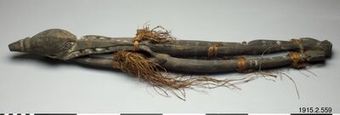Connect with Horniman Museum and Gardens
Contact this content partner to get more information about this item.
ancestor figure
- Description:
- Female Commemorative Figure, Kulap, Punam people, New Ireland, Papua New Guinea. This female figurative sculpture was carved from limestone by a carver of the Punam people, who live in the Rossel Mountains in the southern interior of New Ireland. Known as kulap, these sculptures were only made by the Punam for export to their neighbours; their neighbours acquired these important objects only from the Punam, and never carved them themselves. How this situation arose is now lost in the prehistory of New Ireland. Kulap were used by the lowlanders as commemorative mortuary images – a female image being acquired for a mourned female, and a male image for a male. These were displayed alongside the images of other recently deceased people in small mortuary houses, which were concealed behind high fences. Only male relatives were permitted to see inside the fences. The figures were understood to draw the spirit of the deceased person to them, and thereby prevent the spirit from causing misfortune to the village’s living population. After a short while, the image was secretly removed from the mortuary house by one of the deceased’s male relatives, and either destroyed or discarded at some distance from the village. It is perhaps likely that Punam limestone carvings were formerly used by them in the same way as their neighbours, and became a fashionable substitute for wooden sculptures that were formerly made by their neighbours; this is quite possible, as the use of kulap in southern New Ireland has several parallels with the use of wooden malagan carvings in the northern parts of the same island. Limestone. Late 19th Century. Formerly in the private collection of Mr W.D. Webster. Chalk-limestone ancestral female figure, made in the southern highlands of New Ireland but used in the southern lowlands. Such figures were set up in shrines to commemorate deceased women.
- Format:
- image
- Collections:
- Horniman Museum and Gardens
- Content partner:
- Horniman Museum and Gardens
- Availability:
- Not specified
-
Copyright status: All rights reservedFind out more about what you are able to do with this itemThis item is all rights reserved, with means you'll have to get permission from Horniman Museum and Gardens before using it. For more information, please see our use and reuse page.More informationHorniman Museum and Gardens has this to say about the rights status of this item:
http://rightsstatements.org/vocab/InC/1.0/
What can I do with this item?Non-infringing useNZ copyright law does not prevent every use of a copyright work, and this item may be hosted by an international institute or organisation. You should consider what you can and cannot do with a copyright work.No sharingYou may not copy and/or share this item with others without further permission. This includes posting it on your blog, using it in a presentation, or any other public use.No modifyingYou are not allowed to adapt or remix this item into any other works.No commercial useYou may not use this item commercially.
Related items
Welcome and warm Pasifik greetings
The information on this site has been gathered from our content partners.
The names, terms, and labels that we present on the site may contain images or voices of deceased persons and may also reflect the bias, norms, and perspective of the period of time in which they were created. We accept that these may not be appropriate today.
If you have any concerns or questions about an item, please contact us.


